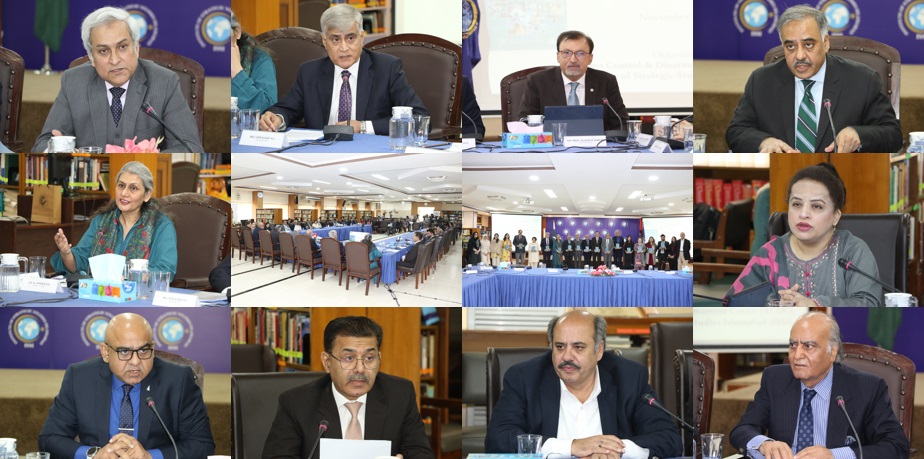
Islamabad, 6 November 2025(Ghufran): The Arms Control and Disarmament Centre (ACDC) at the Institute of Strategic Studies Islamabad (ISSI) organized the launch of its latest book titled “A New Era of Uncertainty: Emerging Technologies and Strategic Stability.” The event brought together distinguished experts, scholars, and policymakers to discuss the implications of Emerging and Disruptive Technologies (EDTs) for global and regional strategic stability. The launch featured contributions from Air Commodore (Retd) Khalid Banuri, Advisor, Air Headquarters (AHQ); Dr. Mehreen Afzal, Director, GRC; Dr. Zafar Nawaz Jaspal; Major General (R) Ausaf Ali, Advisor, Strategic Plans Division (SPD); Ms. Tanzeela Khalil; and Mr. Zohaib Altaf. Dr. Asma Shakir Khawaja, Executive Director, CISS-AJK, and Dr. Zahir Kazmi, Advisor, SPD, participated as discussants. Ambassador Tahir Hussain Andrabi, Spokesperson, Ministry of Foreign Affairs, graced the occasion as Chief Guest. In his keynote remarks, Ambassador Tahir Hussain Andrabi lauded the book as a timely and insightful contribution that comprehensively examines the role of EDTs across all five domains—land, sea, air, space, and cyberspace. He underscored the importance of responsible use and regulation of emerging technologies, highlighting Pakistan’s active participation in international forums, including the United Nations, on these critical issues. Ambassador Sohail Mahmood, Director General ISSI, observed that advancements in Artificial Intelligence, quantum computing, hypersonic weapons, cyber capabilities, and the militarization of space are fundamentally reshaping deterrence and global power dynamics. He praised the book for effectively capturing the transformative essence of this technological era, describing it as both an academic guide and a policy reference. He further noted that the South Asian region faces unique challenges due to the technological revolution’s impact on its delicate strategic balance.
Director ACDC, Malik Qasim Mustafa, emphasized that the book does not merely catalogue technological developments but critically examines how AI, quantum technologies, cyber capabilities, and autonomous systems are redefining global security, partnerships, and strategic stability. During the panel discussion, Air Commodore (Retd) Khalid Banuri highlighted the accelerating pace of military transformation driven by EDTs, which increasingly blur the lines between peace and conflict. Dr. Mehreen Afzal discussed the dual-use nature of AI in cybersecurity—serving both as a tool of defence and a potential vector for new risks such as deepfakes and data manipulation. Major General (R) Ausaf Ali elaborated on the growing use of autonomous weapons and drones, noting their asymmetric potential and the urgent need for confidence-building measures and governance mechanisms. Dr. Zafar Nawaz Jaspal analyzed the implications of EDTs for nuclear deterrence and stability, noting divergent views on whether these technologies strengthen or erode deterrence dynamics. Discussants Dr. Asma Shakir Khawaja and Dr. Zahir Kazmi commended the ACDC for assembling diverse perspectives. Dr. Khawaja stressed the importance of ethical innovation and balanced doctrinal development, while Dr. Kazmi highlighted that technological advances have outpaced strategy and law, calling for doctrinal innovation and ethical oversight. The event concluded with a vote of thanks by Ambassador Khalid Mahmood, Chairman Board of Governors, ISSI, followed by a group photo.